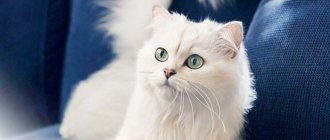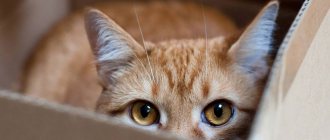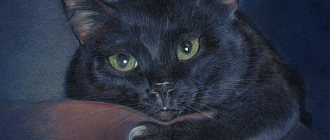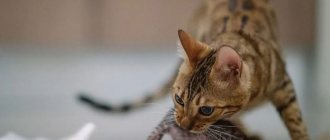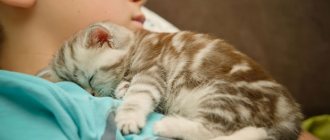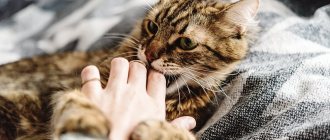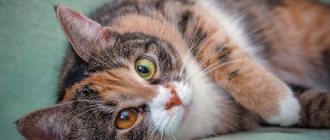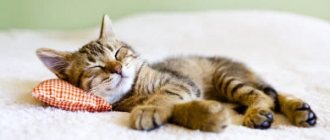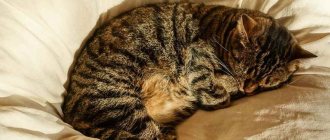Is it possible to say with certainty why cats lie on their feet?
There are still no 100% confirmed conclusions from felinologists on this topic. All explanations are based only on guesswork and currently known facts.
Scientists have found that the habit of sleeping in the legs appears only with age. Kittens usually huddle on their chests. They are attracted to the heart rhythm, reminiscent of the mother and the pleasant feeling of security inside her womb. But over time, they understand that sleeping in this place is more expensive for themselves.
A sleeping person constantly tosses and turns, every now and then risking running over the unfortunate pet. Because of this, they have to move to the very bottom or to the head. It is much more difficult to get accidentally injured here, so this decision is directly related to the instinct of self-preservation.
Esoteric
According to bioenergetics, a person draws energy from space through his head. Passing through the body, part of the positive charge is “contaminated” and becomes negative. Negative energy comes out through the legs into the ground. Being naturally sensitive to geomagnetic vibrations, cats have the ability to cleanse clogged auras and neutralize negativity.
Intuitively, they find the most problematic places in their owners and also unconsciously heal the “holes” in their energy field. There are many cases where people confidently declare that their furry home healers helped get rid of varicose veins and other diseases associated with improper blood circulation in the lower extremities.
What reasons are usually given?
Possible causes are divided into 4 large groups. Some of them have a fairly logical explanation, so it’s hard to disagree with them. Others make atheists and skeptics smile. Despite this, each of them has the right to exist.
Behavioral
Behavioral reasons include the emotions displayed by our pets. The appearance of a cat in your bed may mean:
- Love, affection, gratitude, trust and any other positive feelings.
If your pet purrs peacefully, moves its paws or lets you scratch its tummy, you can be proud of yourself. Being with you, he feels safe, so he easily falls into a deep sleep, snoring funny.
- Jealousy and possessiveness.
By actively rubbing against the owner and his personal belongings, the cat leaves its invisible marks that scare away potential rivals.
- Boredom.
Cats haven't walked on their own for a long time. Some of them become much more attached to people than dogs. When left alone, they feel very sad, and immediately after the person returns they try to curl up in a ball next to him.
- Subordination.
Most often, mustachioed pets choose only one bipedal favorite. By going to bed with him, they recognize him as a leader and accept their secondary role.
These explanations are based on the owners' guesses, so you can easily choose your own version. More interesting versions include physiological ones, but their inherent reasoning is no longer so romantic.
Physiological
If a cat sleeps at their feet, then most likely this is due to the peculiarities of their behavior. The mustachioed pets love secluded boxes, warm radiators, the smell of milk and delicious food. It sounds strange, but all this can be found next to the owner:
- Safety.
In addition to the least threat from an accidental coup, the cat is attracted to the feeling of security created by a fence of legs.
- Warm.
A special love for sleeping together manifests itself in winter. Additional heating is provided by a blanket or blanket.
- Smell.
Animals often climb into a baby's crib, attracted by the sweetish smell of the baby. Adult owners smell differently. Their pet associates them more with maternal warmth and safety.
- Practicality.
Being in the feet, the cat will very easily feel the awakening of their owner. Thanks to this, the mustachioed scoundrels easily adapt to your regime, trying to beg for something tasty in the morning.
The next theory is based on the mystical ability to sense illness. But there is a logical explanation for it too - love for warmth.
Theory about foot diseases
Inflammatory processes are accompanied by an increase in local temperature in the affected areas. If the mustache is increasingly attached to your knees, check with a doctor for arthrosis, myositis and other joint pathologies.
From the realm of the supernatural
Trying to understand why a cat sleeps at a person’s feet, esotericists came to the theory of energy fields. According to it, in the lower part of the body there are chakras with negative energy, and in the upper part - with positive energy. Our pets sense this difference and remove negativity, sucking out bad energy, like energy vampires.
For a long time, most folk superstitions have reduced sleeping together with a mustachioed pet to imminent misfortune. But such considerations have long been left aside, since over the years love and affection for pets has only increased.
The cat is licking or scratching
The habit of cats to lick and comb themselves from morning to evening is reflected in folk signs and, as a rule, promises the arrival of guests or a change in the weather. In fact, the reason for this behavior is not climatic conditions, but a natural desire for cleanliness. A cat will lick anything that seems dirty to it, including its own owner.
Moreover, her concepts of cleanliness do not coincide at all with human ones: hands washed with soap will be licked just as mercilessly as dirty ones. This habit also extends to open wounds, surgical sutures, and bedsores, so veterinarians hinder the process by putting a special collar on the animal.
The second reason for this behavior is the maternal instinct, the pet shows love and care, and the person acts as a child.
Is it beneficial for an owner to sleep with his pet?
The main advantage of sleeping with a cat lies in its purring. Pleasant vibrations have a beneficial effect on the central nervous system, helping to relieve fatigue and tension.
Despite the obvious advantages, not all people are recommended to sleep in the same bed with cats. The main contraindications include the following conditions:
- pregnancy and lactation, which worsen the mother’s body’s defenses;
- age less than 3 years, characterized by a weak immune system;
- allergy to animal fur or saliva;
- somnambulism or too restless sleep, increasing the likelihood of injury to the animal;
- presence of diseases in the cat.
To avoid infection with infections and parasites, it is necessary to regularly vaccinate and treat your pet with antiparasitic drugs. It is better to avoid unauthorized walks on the street to reduce the likelihood of infection from other animals.
Features of cat sleep
Watching how your furry pet sleeps serenely, you can notice interesting features of its behavior:
- Even a cat that seems to be deeply asleep at first glance does not stop reacting to environmental stimuli. Watching carefully, you can see how the whiskers, tips of the ears, eyelids and paws of the animal twitch.
- Foreign neurophysiologists claim that cats dream. Scientists believe that most often they dream of hunting or skirmishes with enemies.
- Furry pets have two stages of sleep: napping and deep sleep. During the first, the animal's muscles remain tense and the metabolism slows down. During this phase, the animal wakes up very quickly at the slightest external stimulus.
Deep sleep is characterized by complete relaxation of the animal's muscles (cats often fall during this process if they fall asleep on a hill). A cat emerges from such sleep much more slowly than from a nap.
- Cats have approximately three times more REM sleep than humans.
- Newborn babies sleep only in deep sleep; their drowsiness phase is not developed.
Spending most of their lives sleeping, pets sometimes choose the most unexpected places to rest: washing machines, closet shelves, carelessly left bags or baskets, etc.
We recommend reading about how to stop a cat from scratching wallpaper and furniture. You will learn about the causes of property damage, methods aimed at eliminating this problem, cutting nails, and eliminating stress factors.
Here's more information on how to trim a cat's claws.
Does it make sense to interfere with an animal's habit?
If necessary, you can easily change your pet's established habit. To correct behavior, it is necessary to reconsider the existing sleeping place and daily routine.
Weaning off co-sleeping
If falling asleep together is marred by waking up too early, periodic biting of heels, or constant stress due to the fear of harming the animal by accidentally turning around, give it up in favor of your health.
Instead of your own bed, offer an equally tempting place, based on the cat’s basic needs:
- Warm.
Place the bed on the radiator or next to the heater. For added comfort, place a soft blanket inside.
- Security.
Most mustachioed pets prefer closed houses or ordinary cardboard boxes.
- Purity.
Regularly remove accumulated hair and dust from the sleeping area.
- Calm.
Make sure your pet is not disturbed by bright lights or extraneous sounds. Also be sure to place a favorite toy or your T-shirt next to him. Familiar smells will help you relax and get used to an unfamiliar environment much faster.
- The desire to control the situation.
The chosen place should be on a hill so that the cat can always monitor ongoing events from a safe hiding spot.
Getting used to a new place can take a lot of time, so be patient. Do not scold the animal or kick it out of your room. Instead, try to give him more attention by involving him in joint games.
After a hearty dinner, carefully move the cat to the bed and stay next to him until he falls asleep. Repeat this procedure every evening and be sure to praise your pet if he takes the initiative and lies down on his own.
